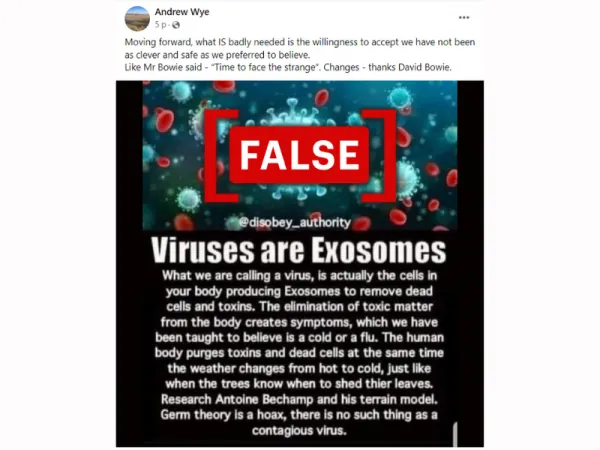By: Karin Koronen
June 28 2024
 Source: Facebook/Screenshot/Modified by Logically Facts
Source: Facebook/Screenshot/Modified by Logically Facts
Viruses and exosomes have distinct origins, functions, and implications for health.
Context
A post on Facebook claims that viruses are exosomes (archived here). It says that cells in your body produce exosomes to remove dead cells and toxins, and then, due to eliminating toxic matter, symptoms attributed to flu or a cold appear. The post ends by claiming germ theory is a hoax and that there is no such thing as a contagious virus. The photo – since deleted – was initially shared by an Instagram account known for spreading misinformation and conspiracy theories.
The notion that viruses are exosomes produced by cells to remove dead cells and toxins is a fringe theory that does not have scientific support or consensus. The virus versus exosome debate largely gained popularity during the COVID-19 pandemic.
In fact
According to medical research company Cell Guidance Systems, exosomes share many similarities to viruses, such as their size, lipid coat, and ability to transport Ribonucleic acid (RNA) and proteins between cells. A paper from the scientific journal "Frontiers in Immunology" states that if exosomes are released from virus-infected cells, they carry virus-infected cargo, playing a significant role in the replication, transmission, and infection of many viruses.
Virus-associated exosomes can facilitate immune evasion and stimulate the body's antiviral immune response, thereby modulating the immune response in both directions. On the one hand, they enhance virus replication, transmission, and infection while suppressing antiviral immunity. On the other hand, they restrict viral infection and strengthen antiviral immunity.
However, exosomes and viruses can not be equated, as the two also have several differences.
Firstly, according to medical research, exosomes are cell-derived extracellular vesicles, while viruses are non-cellular infectious agents that originate from outside the host cell. Exosomes are actively synthesized and do not simply reconstitute parental cell composition through passive generation like viruses.
Secondly, according to a paper published in the scientific journal BioMed Central, exosomes are created when the endosomal membrane buds inward, forming multivesicular bodies (MVBs). These MVBs subsequently merge with the plasma membrane, releasing exosomes into the extracellular space. Meanwhile, viruses are assembled in a host cell following the introduction of viral genetic material (DNA or RNA). Exosomes are a part of the body's normal physiological processes, while viruses are parasitic entities.
Thirdly, exosomes do not contain genomic material for replication, while viruses do. The two also have different functions. While exosomes are involved in cell-to-cell communication and transfer proteins, being mostly beneficial, viruses hijack the host cell's machinery to replicate their genetic material, often causing diseases and immune responses.
And lastly, they also differ in their pathological role and therapeutic use. Exosomes have the properties to be used in drug delivery and regenerative medicine. However, they can also be involved in the progression of diseases, such as cancer, by spreading oncogenic factors. Viruses are known to cause a wide range of diseases, but oncolytic viruses can also be used in gene therapy.
To conclude, the two cannot be equated despite their similarities and the aid that exosomes might provide in spreading viruses.
The verdict
The vast majority of scientific research and consensus does not support the notion that viruses are exosomes. Though they share many qualities, their fundamental differences in origins, functions, and implications for health make them distinct entities. Therefore, we have marked this claim as false.